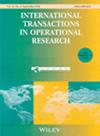快还是慢?竞争下易腐产品的物流方式选择
IF 3.1
4区 管理学
Q2 MANAGEMENT
引用次数: 0
摘要
本研究调查了一个物流博弈,在这个博弈中,两个相互竞争的易腐产品托运人可以在快速和慢速物流方式之间做出选择。快速物流方式能让托运人保持更好的交付产品质量,而慢速物流方式则能提供成本优势。两个托运人分别销售高质量和低质量的产品。我们发现,物流博弈的均衡点取决于两种产品的初始质量、运输时间的差异以及两种物流方式的单位物流成本。此外,运输时间的巨大差异会使高质量的托运人选择快速物流方式,而使低质量的托运人选择慢速物流方式。这样,高质量的托运人可以从交货产品质量的巨大差异中获益,而低质量的托运人则减轻了竞争压力。相反,当快速物流方式的单位物流成本足够高时,运输时间上的微小差异会刺激优质托运人使用慢速物流方式,而劣质托运人则采用快速物流方式。高质量托运人可能会从需求增长中获益,而低质量托运人则应缩小交付产品质量的差异。最后,我们发现,对于高质量托运人来说,更快的物流速度或更高的初始产品质量是有利的,而对于低质量托运人来说,更慢的物流速度或更低的初始产品质量可能是最佳的。这些发现为管理者选择物流方式提供了有益的启示。本文章由计算机程序翻译,如有差异,请以英文原文为准。
Fast or slow? Logistics way choices for perishable products under competition
This study investigates a logistics game where two competing shippers of perishable products may choose between fast and slow logistics ways. The fast logistics way allows a shipper to retain better delivered product quality, whereas the slow one provides a cost advantage. The two shippers sell high- and low-quality products, respectively. We find that the equilibria of the logistics game are determined by the initial qualities of the two products, the differences in the transportation times, and the unit logistics costs of the two logistics ways. Furthermore, a large difference in transportation times enables the high-quality shipper to select the fast logistics way but the low-quality shipper to choose the slow logistics. In this way, the high-quality shipper can benefit from the large difference in delivered product qualities, whereas the low-quality shipper alleviates the pressure of competition. By contrast, when the unit logistics cost of the fast logistics way is sufficiently high, a small difference in transportation times stimulates the high-quality shipper to use the slow logistics way but the low-quality shipper to adopt the fast logistics. The high-quality shipper may seek the benefit from an increase in demand, whereas the low-quality shipper should narrow the difference in delivered product qualities. Finally, we find that faster logistics or higher initial product quality is beneficial to the high-quality shipper, whereas slower logistics or lower initial product quality may be optimal for the low-quality shipper. These findings offer useful insights for managers to choose their logistics ways.
求助全文
通过发布文献求助,成功后即可免费获取论文全文。
去求助
来源期刊

International Transactions in Operational Research
OPERATIONS RESEARCH & MANAGEMENT SCIENCE-
CiteScore
7.80
自引率
12.90%
发文量
146
审稿时长
>12 weeks
期刊介绍:
International Transactions in Operational Research (ITOR) aims to advance the understanding and practice of Operational Research (OR) and Management Science internationally. Its scope includes:
International problems, such as those of fisheries management, environmental issues, and global competitiveness
International work done by major OR figures
Studies of worldwide interest from nations with emerging OR communities
National or regional OR work which has the potential for application in other nations
Technical developments of international interest
Specific organizational examples that can be applied in other countries
National and international presentations of transnational interest
Broadly relevant professional issues, such as those of ethics and practice
Applications relevant to global industries, such as operations management, manufacturing, and logistics.
 求助内容:
求助内容: 应助结果提醒方式:
应助结果提醒方式:


